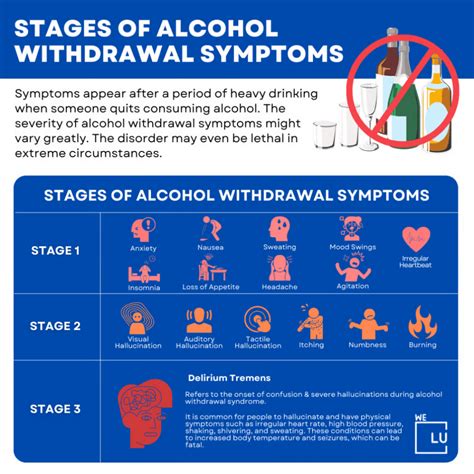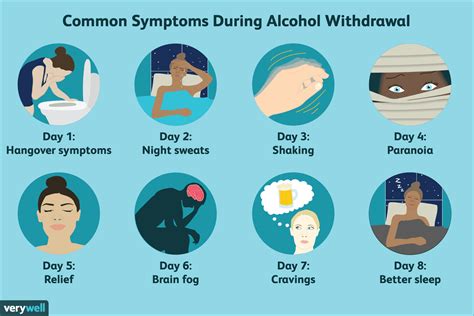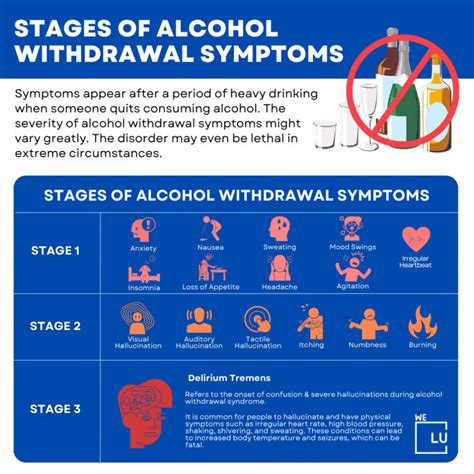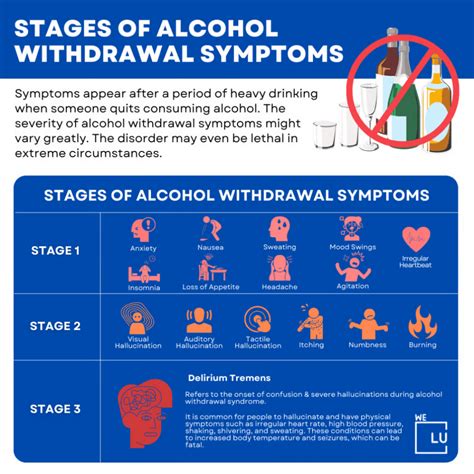Intro
Discover the 7 alcohol withdrawal symptoms, including tremors, seizures, and hallucinations, and learn about detoxification, addiction treatment, and recovery options to manage withdrawal syndrome and achieve sobriety.
Alcohol withdrawal symptoms can be a challenging and potentially life-threatening experience for individuals who have been drinking heavily for an extended period. The symptoms can range from mild to severe and can be both physical and psychological. It is essential to understand the symptoms of alcohol withdrawal to provide proper support and care to those who are struggling with addiction. In this article, we will delve into the world of alcohol withdrawal symptoms, exploring the causes, effects, and treatment options available.
The importance of understanding alcohol withdrawal symptoms cannot be overstated. Alcohol addiction is a widespread problem that affects millions of people worldwide, and the withdrawal process can be a significant obstacle to overcoming addiction. By recognizing the symptoms of alcohol withdrawal, individuals can seek help and support, increasing their chances of a successful recovery. Furthermore, understanding the symptoms can also help loved ones and healthcare professionals provide the necessary care and support to those struggling with addiction.
Alcohol withdrawal symptoms can be a complex and multifaceted issue, involving both physical and psychological factors. The symptoms can be triggered by a range of factors, including the amount and frequency of alcohol consumption, the duration of addiction, and the individual's overall health. It is crucial to approach the topic with sensitivity and compassion, recognizing that addiction is a disease that requires treatment and support. By exploring the causes, effects, and treatment options of alcohol withdrawal symptoms, we can work towards creating a more supportive and inclusive environment for those struggling with addiction.
What are Alcohol Withdrawal Symptoms?

Causes of Alcohol Withdrawal Symptoms
The causes of alcohol withdrawal symptoms are complex and multifaceted. Alcohol addiction can alter the brain's chemistry, leading to physical dependence on the substance. When an individual suddenly stops or reduces their alcohol consumption, the brain is unable to adapt, leading to a range of symptoms. The severity of the symptoms can depend on various factors, including the amount and frequency of alcohol consumption, the duration of addiction, and the individual's overall health.Types of Alcohol Withdrawal Symptoms

Treatment Options for Alcohol Withdrawal Symptoms
Treatment options for alcohol withdrawal symptoms can vary depending on the severity of the symptoms and the individual's overall health. Some common treatment options include: * Medications: Benzodiazepines, such as diazepam or lorazepam, can help alleviate symptoms such as anxiety, insomnia, and seizures * Therapy: Counseling and therapy can help individuals address underlying issues and develop coping strategies * Support groups: Joining a support group, such as Alcoholics Anonymous, can provide a sense of community and support * Hospitalization: In severe cases, hospitalization may be necessary to monitor and manage symptomsManaging Alcohol Withdrawal Symptoms

Preventing Alcohol Withdrawal Symptoms
Preventing alcohol withdrawal symptoms requires a long-term commitment to reducing or eliminating alcohol consumption. Some strategies for preventing symptoms include: * Seeking support: Joining a support group or seeking counseling can provide a sense of community and support * Setting boundaries: Establishing boundaries and avoiding triggers can help reduce the risk of relapse * Engaging in healthy activities: Engaging in healthy activities, such as exercise or hobbies, can help reduce stress and anxietyComplications of Alcohol Withdrawal Symptoms

Seeking Help for Alcohol Withdrawal Symptoms
Seeking help for alcohol withdrawal symptoms is essential for individuals who are struggling with addiction. Some resources for seeking help include: * Healthcare providers: Consulting with a healthcare provider can provide a comprehensive assessment and treatment plan * Support groups: Joining a support group, such as Alcoholics Anonymous, can provide a sense of community and support * Hotlines: Calling a hotline, such as the National Alcoholism and Substance Abuse Information Center, can provide immediate support and guidanceConclusion and Next Steps

We invite you to share your thoughts and experiences with alcohol withdrawal symptoms in the comments below. If you or someone you know is struggling with addiction, we encourage you to seek help and support. You can also share this article with others who may be struggling with addiction, and let's work together to create a more supportive and inclusive environment for those struggling with addiction.
What are the symptoms of alcohol withdrawal?
+The symptoms of alcohol withdrawal can range from mild to severe and can include tremors, seizures, hallucinations, and delirium tremens.
How long do alcohol withdrawal symptoms last?
+The duration of alcohol withdrawal symptoms can vary depending on the individual and the severity of the symptoms. In general, symptoms can last from a few days to several weeks.
Can alcohol withdrawal symptoms be life-threatening?
+Yes, alcohol withdrawal symptoms can be life-threatening. Seizures, delirium tremens, and dehydration can be severe and potentially life-threatening complications of alcohol withdrawal.
How can I manage alcohol withdrawal symptoms?
+Managing alcohol withdrawal symptoms requires a comprehensive approach that addresses both physical and psychological factors. Strategies for managing symptoms include staying hydrated, eating a healthy diet, getting enough rest, and engaging in relaxation techniques.
Where can I seek help for alcohol withdrawal symptoms?
+There are several resources available for seeking help for alcohol withdrawal symptoms, including healthcare providers, support groups, and hotlines. It is essential to seek help and support to increase the chances of a successful recovery.
